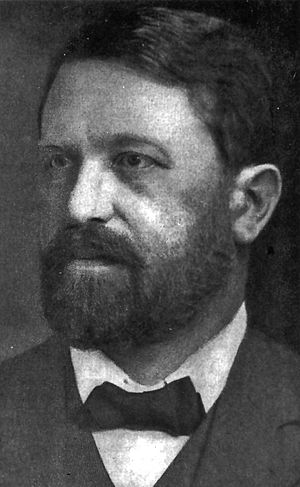Theodor Boveri facts for kids
Quick facts for kids
Theodor Boveri
|
|
|---|---|
 |
|
| Born | 12 October 1862 |
| Died | 15 October 1915 |
| Nationality | German |
| Known for | Embryonic development Boveri-Sutton chromosome theory Centrosome |
| Scientific career | |
| Fields | Genetics, Cell biology |
Theodor Heinrich Boveri (born October 12, 1862 – died October 15, 1915) was a German biologist. He made important discoveries about cell biology, how embryos develop, and genetics. His main work focused on how a new living thing grows from its parents' cells.
Boveri studied sea urchins to understand development. He found that all chromosomes must be present for an embryo to grow correctly. This discovery was a key part of the Boveri-Sutton chromosome theory.
He also discovered the centrosome in 1888. He called it the "special organ of cell division." Boveri also noticed something called chromatin diminution. This is when parts of chromosomes are lost during the early growth of some worms.
Chromosomes and Heredity
From 1902 to 1904, Boveri wrote several papers. He pointed out how chromosomes behave in a way that matches Gregor Mendel's ideas about heredity. Mendel was a scientist who studied how traits are passed down.
Boveri believed that chromosomes were "independent entities." This means they keep their unique features even when a cell is not dividing. He said, "What comes out of the nucleus is what goes into it." This highlights that chromosomes carry genetic information.
In 1903, Walter Sutton also suggested that chromosomes are the units that carry traits. He noted that they separate in a way that follows Mendel's rules. E.B. Wilson, who was Sutton's teacher, later named this idea the Sutton–Boveri hypothesis. This hypothesis explains how genetic information is passed from parents to offspring.
Boveri's Idea About Cancer
Theodor Boveri also had an important idea about cancer. He thought that a cancerous tumor starts from just one cell. In this cell, the chromosomes become mixed up or damaged. This damage causes the cell to divide without stopping.
For a long time, scientists worked to prove this idea. Later, researchers like Thomas Hunt Morgan showed that Boveri's theory was correct. His early ideas helped us understand cancer much better.
See also
 In Spanish: Theodor Boveri para niños
In Spanish: Theodor Boveri para niños

